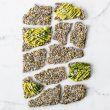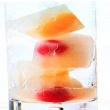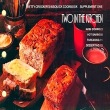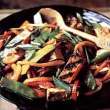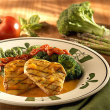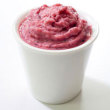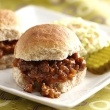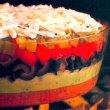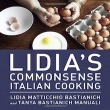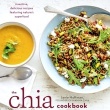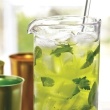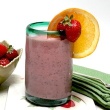Recipe: Lean Cooking Broth and Article: Chicken Soup: Another Way to Show You Care
SoupsCHICKEN SOUP: ANOTHER WAY TO SHOW YOU CARE
Steaming chicken soup is the antidote for many ills, from the flu to a case of low down blues. Called Jewish penicillin, many people rely on it to relieve congestion from a cold or flu. But this homey elixir can promote good health in other ways, as well.
Chicken broth is my favorite facilitator for low-fat cooking. I use it regularly in place of oil when cooking vegetables, chicken and seafood. For this, I want a broth that is lean yet flavorful enough to compensate for what is lost when fat is cut from recipes. To get this flavor, I make a special chicken stock, which I call cooking broth.
The ideal chicken broth for soups is golden and clear. I like it to taste of chicken and little else, with just a hint of vegetables rounding out the flavor. However, when a few tablespoons of broth are used in place of oil, while its color does not matter, a flavor full enough to enhance mild-tasting main ingredients like chicken breast or flounder is essential.
This cooking broth includes leek tops, unpeeled carrots, and plenty of herbs, fresh and dried. It is dark and not always clear, depending on precisely what vegetables I use. I skip garlic to avoid the strange taste it gets when the stock is stored, and don't use cruciferous vegetables like broccoli or cabbage, because their flavor tends to overpower all others in the pot. I favor using free-range or so-called naturally raised chickens. They tend to be leaner than other poultry and have firmer flesh. Using a whole bird also provides meat to use in subsequent dishes. (I remove the chicken after an hour, when its meat still has appealing texture, and continue cooking the broth to concentrate it.)
As when making classic chicken soup, I start with cold water, which dissolves the desirable materials from the bones better than warm water. I never let the pot boil, and always skim off the foam which rises to the surface. You must do both to keep the broth from getting cloudy or tasting bitter, and to prevent the fat from getting emulsified in the liquid.
When you don't want to start from scratch, use canned broth, add the other ingredients, and simmer until the cooking broth suits your taste.
LEAN COOKING BROTH
3 1/2 pound chicken
2 carrots, halved crosswise
2 Spanish onions, quartered
1 leek, with greens, cut in 3-inch pieces
8 sprigs Italian parsley
6 sprigs dill
6 sprigs thyme, or 1 1/2 tsp. dried
1 sprig rosemary, or 1 tsp. dried
1 tsp. black peppercorns
2 bay leaves
Place the chicken, with its neck, gizzard, and heart, in a large soup pot, together with the carrots, onion, leek, parsley, dill, thyme, rosemary, peppercorns, and bay leaves. Add 4 quarts cold water and set the pot over high heat.
As soon as the pot starts bubbling, before it comes to a boil, reduce the heat until the liquid just bubbles gently. Cook the soup until the chicken is cooked, about 1 hour, skimming the top to remove the foam that rises to the surface. Remove the chicken.
Continue cooking the broth until it is reduced by about one-third and tastes concentrated.
Meanwhile, when the chicken is cool enough to handle, remove and discard the skin. Pull the meat from the bones and reserve it for another use.
When the broth is done, strain it into a large container, pressing on the solids from the pot to extract their juices. Cool, then chill the stock completely to congeal the fat on its surface.
Skim off this fat. Transfer the stock to smaller containers, such as ice cube trays, and freeze, then store the cubes in a plastic bag, or pour the stock into sealable plastic bags and freeze.
Use as needed in cooking vegetables, chicken, and seafood.
Each cup of broth contains approximately 25 calories and less than 1 gram of
fat
Source: Dana Jacobi for the American Institute for Cancer Research
Steaming chicken soup is the antidote for many ills, from the flu to a case of low down blues. Called Jewish penicillin, many people rely on it to relieve congestion from a cold or flu. But this homey elixir can promote good health in other ways, as well.
Chicken broth is my favorite facilitator for low-fat cooking. I use it regularly in place of oil when cooking vegetables, chicken and seafood. For this, I want a broth that is lean yet flavorful enough to compensate for what is lost when fat is cut from recipes. To get this flavor, I make a special chicken stock, which I call cooking broth.
The ideal chicken broth for soups is golden and clear. I like it to taste of chicken and little else, with just a hint of vegetables rounding out the flavor. However, when a few tablespoons of broth are used in place of oil, while its color does not matter, a flavor full enough to enhance mild-tasting main ingredients like chicken breast or flounder is essential.
This cooking broth includes leek tops, unpeeled carrots, and plenty of herbs, fresh and dried. It is dark and not always clear, depending on precisely what vegetables I use. I skip garlic to avoid the strange taste it gets when the stock is stored, and don't use cruciferous vegetables like broccoli or cabbage, because their flavor tends to overpower all others in the pot. I favor using free-range or so-called naturally raised chickens. They tend to be leaner than other poultry and have firmer flesh. Using a whole bird also provides meat to use in subsequent dishes. (I remove the chicken after an hour, when its meat still has appealing texture, and continue cooking the broth to concentrate it.)
As when making classic chicken soup, I start with cold water, which dissolves the desirable materials from the bones better than warm water. I never let the pot boil, and always skim off the foam which rises to the surface. You must do both to keep the broth from getting cloudy or tasting bitter, and to prevent the fat from getting emulsified in the liquid.
When you don't want to start from scratch, use canned broth, add the other ingredients, and simmer until the cooking broth suits your taste.
LEAN COOKING BROTH
3 1/2 pound chicken
2 carrots, halved crosswise
2 Spanish onions, quartered
1 leek, with greens, cut in 3-inch pieces
8 sprigs Italian parsley
6 sprigs dill
6 sprigs thyme, or 1 1/2 tsp. dried
1 sprig rosemary, or 1 tsp. dried
1 tsp. black peppercorns
2 bay leaves
Place the chicken, with its neck, gizzard, and heart, in a large soup pot, together with the carrots, onion, leek, parsley, dill, thyme, rosemary, peppercorns, and bay leaves. Add 4 quarts cold water and set the pot over high heat.
As soon as the pot starts bubbling, before it comes to a boil, reduce the heat until the liquid just bubbles gently. Cook the soup until the chicken is cooked, about 1 hour, skimming the top to remove the foam that rises to the surface. Remove the chicken.
Continue cooking the broth until it is reduced by about one-third and tastes concentrated.
Meanwhile, when the chicken is cool enough to handle, remove and discard the skin. Pull the meat from the bones and reserve it for another use.
When the broth is done, strain it into a large container, pressing on the solids from the pot to extract their juices. Cool, then chill the stock completely to congeal the fat on its surface.
Skim off this fat. Transfer the stock to smaller containers, such as ice cube trays, and freeze, then store the cubes in a plastic bag, or pour the stock into sealable plastic bags and freeze.
Use as needed in cooking vegetables, chicken, and seafood.
Each cup of broth contains approximately 25 calories and less than 1 gram of
fat
Source: Dana Jacobi for the American Institute for Cancer Research
- Post Reply
- Post New
- Save to Recipe Box
ADVERTISEMENT
Random Recipes from:
Soups
Soups
- Moroccan Spiced Red Lentil Soup
- Fresh Pea Soup (blender)
- Sweet Potato Orange Bisque with Cinnamon Sour Cream (blender)
- Sopa de Lima (Mexican)
- Rosemary Split Pea Soup with Meatballs
- Lexie's on the River Asparagus Vichyssoise (blender)
- Plantain Soup for Randy
- Olive Garden Zuppa Toscana - variation
- Creamy Carrot and White Bean Soup with Roasted Garlic (food processor)
- Cuban Black Bean Soup (crock pot)
UPLOAD AN IMAGE
Allowed file types: .gif .png .jpg .jpeg
Allowed file types: .gif .png .jpg .jpeg
POST A REPLY
Post a Request - Answer a Question
Share a Recipe
Thank You To All Who Contribute
Post a Request - Answer a Question
Share a Recipe
Thank You To All Who Contribute
POST A NEW MESSAGE
Post a Request - Answer a Question
Share a Recipe
Thank You To All Who Contribute
Post a Request - Answer a Question
Share a Recipe
Thank You To All Who Contribute



